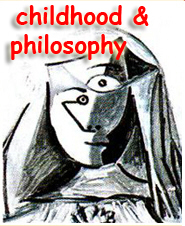the stories we live by: narrative in ethical enquiry with children
Keywords:
ethics, moral, stories, literature, children, children's literature, philosophical enquiry, narrative ethical enquiry, perception, Oscar Wilde,Abstract
Many readers will be familiar with the power of stories to stimulate rich, ethically-focussed philosophical enquiry with communities of children and young people. This paper presents a view of the relationship between ethics and narrative that attempts to explain why this is the case. It is not an accident that moral matters are illuminated in stories, nor is the explanation for this fitness for purpose merely pragmatic, or a matter of convention. Narrative is at the heart of learning how to live a good live and living that life. Unlike other forms of organising human experience, such as mathematics or science, narrative represents ethical experience particularly well. This is possible because of the logical structures of human experience that narrative successfully communicates (such as time, causality and intentionality) and because of the human faculties that it successfully engages (the emotions, the imagination and the intellect), which are the faculties we use in ethical life. Understood in this way, narrative is both a source, and a method of ethical knowledge and understanding. The implication of this claim is that narrative is is not only useful as a stimulus for ethical enquiry in the way in which delegates may be familiar. According to my account, telling and being told stories and exploring narrative features such as character and setting constitute a form of ethical enquiry in their own right. These activities require us to engage the same faculties at work in ethical life and in doing so, we gain ethically relevant experiences that reinforce, challenge and enlarge what we know and understand about the ethical world. However, we do not strive to grasp propositional knowledge through engaging with narratives as a source and method of knowledge and understanding. Books, plays and films on my account, do not have ‘a moral of the story’ that must be grasped and then internalised. What we learn through engagement with narrative is ethical perceptiveness. Perceptiveness in this sense, is knowing how to read and respond to the ethically salient features of a text or an everyday experience. It is a function of the use of our emotion and imagination in conjunction with the intellect. In light of these claims, I advocate ‘Narrative Ethical Enquiry’, a pedagogy that aims at three things I consider to be constitutive of perceptiveness: Ethical awareness: The active and self-conscious identification of the ethical content in stories. Narrative competence: The encouragement of sophisticated acts of giving and receiving stories, as an integral part of ethics education and not just as the basis for an exploration of issues in some other gear e.g. philosophical, legal, scientific, religious etc. Self-conscious enquiry: The recognition – by learners and teachers – of the potential of narratives and active use of narrative to gain ethical knowledge and understanding. Although ethical enquiry in PwC often begins with a story, this does not mean that narrative has been optimised in that educational encounter. Often in a PwC class that begins with a story, there is a hasty move made from an exploration of the detailed content of the story to the identification of one or two ethical concepts followed by the pursuit of understanding through conceptual analysis, the construction of prima facie axioms, principles and other theoretical constructs. All of which operate at a suitably high level of generality and abstraction. This is what philosophy does well, but in in doing so in ethical enquiry, it overlooks narrative features of a stimulus that can offer ethical illumination. Features such as the time and place in which the story takes place; the intentional and emotional states of certain characters; the contingency of certain events and the necessity of others; the uniqueness of the story as a singular whole including its particular details and simultaneously, the generic patterns of tragedy or parody that it assumes. An intellectualistic philosophical engagement with a story will typically neglect the faculties of emotion and imagination that enable us to fully access the ethical dimension of a story and in turn allow us to navigate the ethical dimension of every day life. I propose an approach to ethical enquiry that draws on the self-conscious and systematic clarity of philosophy and the richness, complexity and immediacy of narrative. Philosophical and narrative modes of understanding can - and often do - complement one another in PwC. In proposing Narrative Ethical Enquiry I simply advocate that this be acknowledged, understood and capitalised upon.Downloads
Download data is not yet available.
Downloads
Published
2015-01-30
Issue
Section
articles



